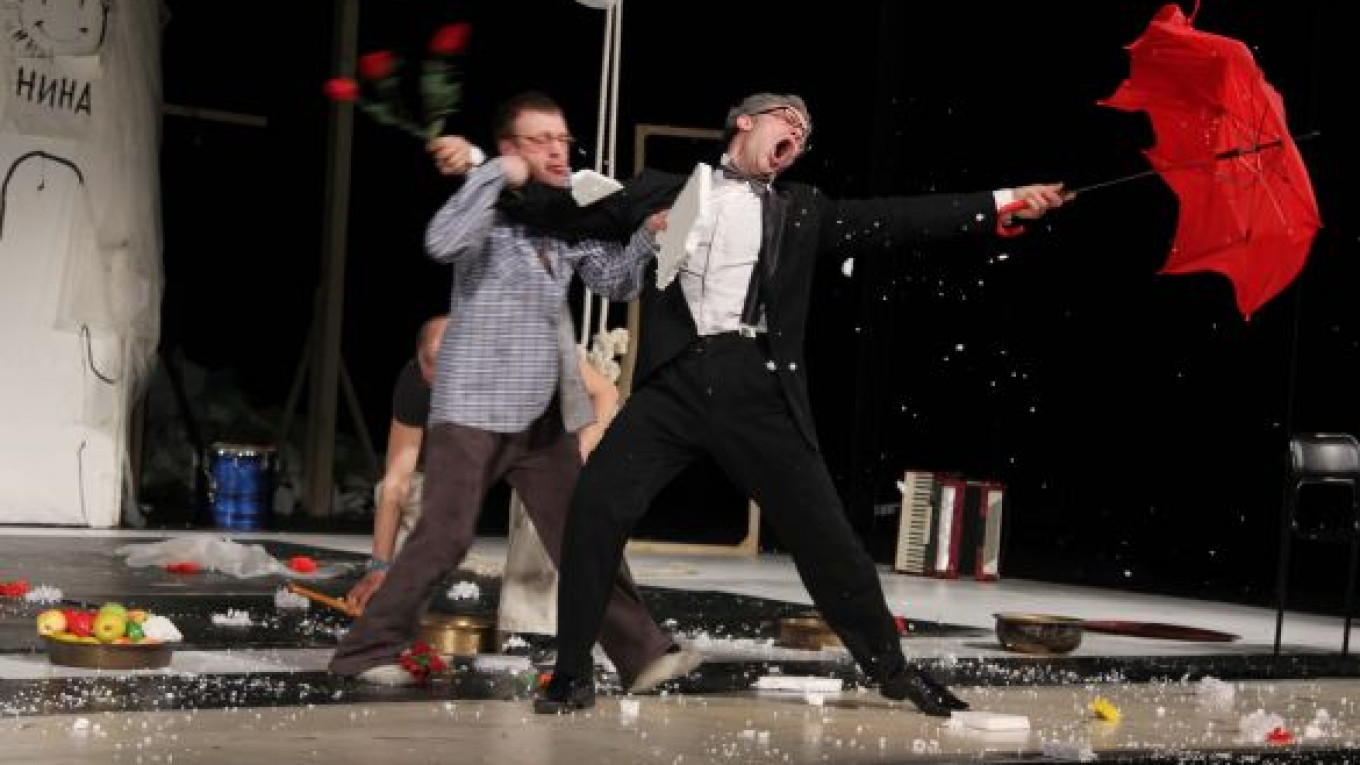Yury Butusov’s new production of Anton Chekhov’s “The Seagull” is the most voluminous I have ever seen of this play. That is not because the performance runs nearly five hours, but because in this director’s hands the text expands to proportions I had never imagined.
Butusov made it seem as though the play actually takes shape before our eyes on the stage of the Satirikon Theater. As if Chekhov words are being written, or rewritten, right there on the spot.
There are numerous reasons why that is so — Butusov shuffled the scenes around; he shuffled the actors around, allowing, for example, five different performers to take on the role of the frustrated young writer Treplev in Act 4; he entirely re-imagined several characters, especially the estate manager Shamrayev, who here is a flamboyant wannabe comedian played by the same actor who plays Shamrayev’s son-in-law.
Butusov himself takes the stage several times in order to lead dances, manipulate stage props or unleash a passionate cri de coeur when, for a moment, he assumes the role of Treplev.
But there is also magic at work here. No simple list of director’s tricks can possibly account for the heights this performance reaches time after time.
“The Seagull” is a play about art and artists. Treplev (Timofei Tribuntsev) imagines himself an innovative writer who, in the famous formula, is seeking “new forms.” His mother Arkadina (Polina Raikina) is a popular provincial actress who brooks no competition for the attention she demands. Her beau and Treplev’s rival Trigorin (Denis Sukhanov) is a well-known writer who, as he implies, writes well though Turgenev writes better. Nina Zarechnaya (Agrippina Steklova), the neighbor girl from across the lake, has it in her mind to be an actress, but does she have what it takes? Even Arkadina’s brother Pyotr Sorin (Vladimir Bolshov) wanted to be a writer in his younger days, although he never became one. And, as noted, Shamrayev (Anton Kuznetsov) here is something of an itinerant clown.
The caustic family doctor Dorn (Artyom Osipov) famously declares at one point, “How nervous everyone is! And how much love there is!” But what really fills Butusov’s version of this play to the brim are the thunder and lightning that explode from the constant flow of creative juices and artistic egos. Even those not involved in the making of art are defined by it.
Chekhov’s melancholy Masha, who hates her father, pines for Treplev but marries a local school teacher and invariably wears black for she is in “mourning for her life.” She is played here by Maryana Spivak as a tough, intelligent woman who is grudgingly willing to play the muse for artists who might be inspired by her.
All of these characters are in the process of creating their lives — or of watching them fall apart, which just may be a closely related activity.
To suggest that visually, designer Alexander Shishkin conceived a set that often looks like the chaotic space of an artist’s workshop. At various times the stage is strewn with ropes, flowers, crosses, stand-alone door frames, crude drawings done live on a paper wall, and a table full of fruit that suggests an extraordinarily luxurious still-life painting.
Chekhov’s tale about the jealousies, rivalries and ambitions among Arkadina, Treplev, Trigorin and Nina Zarechnaya remains intact. But it now slips into the shadow of this production’s main thrust — an attempt to discern what art is, how is it made, who makes it, and why do they do it?
Butusov eliminates the consideration of “success” and “failure” in art. This is an exploration of a process, and that process is the only thing that has meaning.
This is visible clearly in Act 4 when numerous actors share segments of the monologue between Treplev and Zarechnaya. By this time both have had some success — he at writing, she on stage — but both are still wracked by doubts.
By shuffling actors who have played Arkadina, Trigorin, Masha and others into this scene, Butusov creates something of a quadraphonic portrait of the creative personality. He demonstrates that greatness is precariously close to mediocrity while suggesting that the opposite is also true.
As for the price one pays and the rewards one reaps for committing oneself to a life in art, Butusov’s final image provides a stunning answer. A dancing girl (Marina Drovosekova), a character Butusov added to the cast, weeps tears of diamonds.
That, incidentally, is giving nothing away. You’ll have to see this extraordinary production to see how that simple miracle — just one of many — is performed.
“The Seagull” (Chaika) plays Friday, May 12, 15 and 27 at 7 p.m. at the Satirikon Theater, located at 8 Sheremetyevskaya Ulitsa. Metro Marina Roshcha. Tel. 689-7885, www.satirikon.ru. Running time: 4 hours, 45 minutes.
A Message from The Moscow Times:
Dear readers,
We are facing unprecedented challenges. Russia's Prosecutor General's Office has designated The Moscow Times as an "undesirable" organization, criminalizing our work and putting our staff at risk of prosecution. This follows our earlier unjust labeling as a "foreign agent."
These actions are direct attempts to silence independent journalism in Russia. The authorities claim our work "discredits the decisions of the Russian leadership." We see things differently: we strive to provide accurate, unbiased reporting on Russia.
We, the journalists of The Moscow Times, refuse to be silenced. But to continue our work, we need your help.
Your support, no matter how small, makes a world of difference. If you can, please support us monthly starting from just $2. It's quick to set up, and every contribution makes a significant impact.
By supporting The Moscow Times, you're defending open, independent journalism in the face of repression. Thank you for standing with us.
Remind me later.







